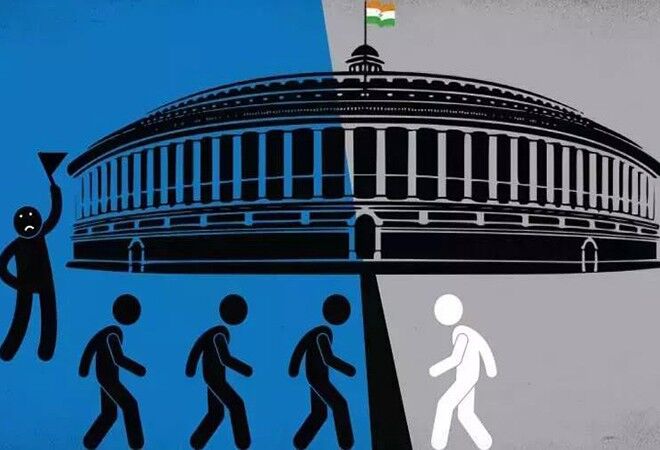An unwelcome 'bargain'
Defections nowadays have come to be crudely associated with personal agenda — benefitting parties and leaders against voters' interests

The year 2022 added another season to the existing seasons, and that season is the "season of political defections". The announcement of the election schedule was followed by a plethora of political defections across parties though only the defections in the crucial state of Uttar Pradesh, and specifically from BJP to other parties, are being highlighted in the media. There is no state and no political party which is not experiencing defections. The spread of defection is analogous to the spread of highly infectious Omicron. Like the unpredictable virus, the defection bug is also infesting leaders across the political spectrum. There is no prior warning; all of a sudden, leaders are found 'positive' for defection.
The change of heart regarding the political party or philosophy, which was rare prior to the emergence of Indira Gandhi on the political scene, has picked up momentum and now, as the 2022 assembly election approaches, the pace of defection is unprecedented. It is not that defections didn't happen in 2021. What is happening in Uttar Pradesh is just an extension of what happened in Bengal last year. But the pace of defections has peaked despite the fact that defections into BJP from TMC didn't help the BJP to dethrone Mamata Banerjee. Neither the earlier defections were ideologically oriented nor are the current ones. It is not the ideology but the personal agenda which has become an overriding factor in prompting defections. Money and power are the only criteria for joining the new party in any defection, and none, including the defectors, can deny this.
Prominent defectors like Swami Prasad Maurya and Dara Singh Chouhan are the past masters of defection. These weather cocks of political atmosphere are early detectors of direction of political winds and, like migrant birds which use the seasonal winds, these leaders migrate to the winning party. Earlier in 2017, they saw victory wind blowing towards the BJP and shifted from BSP to the saffron party. Now they think the wind is blowing towards SP and they spread their wings to fly in that direction. At the same time, two leaders — one sitting MLA from Congress, Naresh Saini, and a former MLA from SP — defected to the BJP. Any politician is capable of defending his action on any issue, so, for these seasoned MLAs, explaining the reasons for their defections is quite easy. After being in ministry for almost five years, both Maurya and Chouhan have cited defective treatment of BCs and SCs by the BJP government to resign from the power and party.
No leader can be denied his freedom to change the party or shift his ideology. The current pack of defectors are enjoying that Constitutional freedom only. Even the anti-defection law prohibits the defection while holding the post if done alone but condones mass defections. So, even legally speaking, the current defectors can't be considered as doing the unholy act. Earlier, observers used to see the BJP and Communist parties as ideologically oriented and different from other parties. But over the years, BJP has dropped its proclamation of 'party with a difference' and started behaving like any other party. With the recent defections of some CPM leaders to Congress and leaders joining the CPM in Kerala, the ideological party tag of Communists was self-robbed.
We heard a lot from Aam Aadmi Party (AAP) chief Aravind Kejriwal on value-based politics. He abhorred political corruption and promised value-based politics. He captured Delhi twice on the slogan of exercising different kinds of politics from the BJP and the Congress. Now in his ambition of expanding his influence into other states, what the AAP chief is doing is to depend on the defectors. In Goa, out of the first list of ten AAP candidates, at least four are defectors from BJP; the next list may include more such names. So, what is the message the parties are giving to the voter? In the elections, the party labels may change but the candidates remain the same. It is going to happen in all the states because the assurance of a ticket is the prime condition for defections, besides hidden benefits offered to the defectors.
For the parties, the ultimate goal is power. They are least worried about the means. What the present BJP is doing was what the Congress did when Indira Gandhi was at the helm. The winning party in Haryana then went straight to Indira Gandhi and joined her party to remain in power and retain position. Such was the power of Indira that it was very difficult for any non-Congress party to remain in power even after getting the people's mandate. Now it is the BJP's turn to take the chance for forming the government even though its majority is in doubt. It happened in Karnataka in 2018 and then in Maharashtra in 2019. Even its Goa government formation in 2017 was based on the strength of defections it engineered.
Now in early 2022, the BJP is facing the effect of desertions from its own camp in UP. No doubt that it is gaining some defectors from other parties — both in UP and Uttarakhand — but the perception is that SP is exhibiting the surge in attracting defectors. It is difficult to expect ethics from the defectors. Once made up his mind to shift the allegiance, the defector will easily find faults in the party in which he was, and virtues in the party which is offering him a better future. The current defectors in UP have a past history of changing parties. Some of the defectors are proudly claiming that whichever party to which they defected gained power in elections, and they are confident of extension of that in 2022.
With defections the parties may gain, the leaders may get the benefits but, ultimately, the voter stands to lose.
Views expressed are personal



